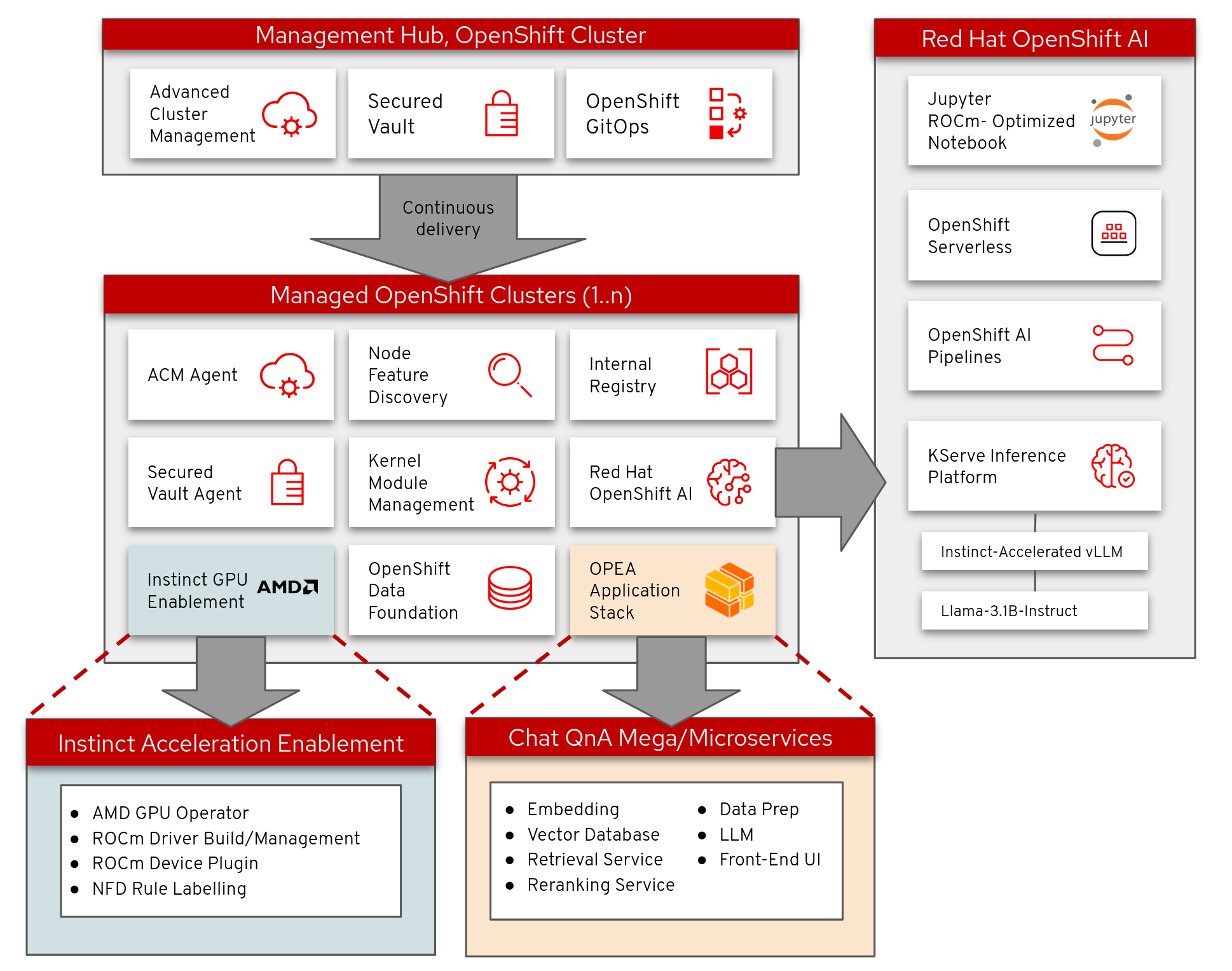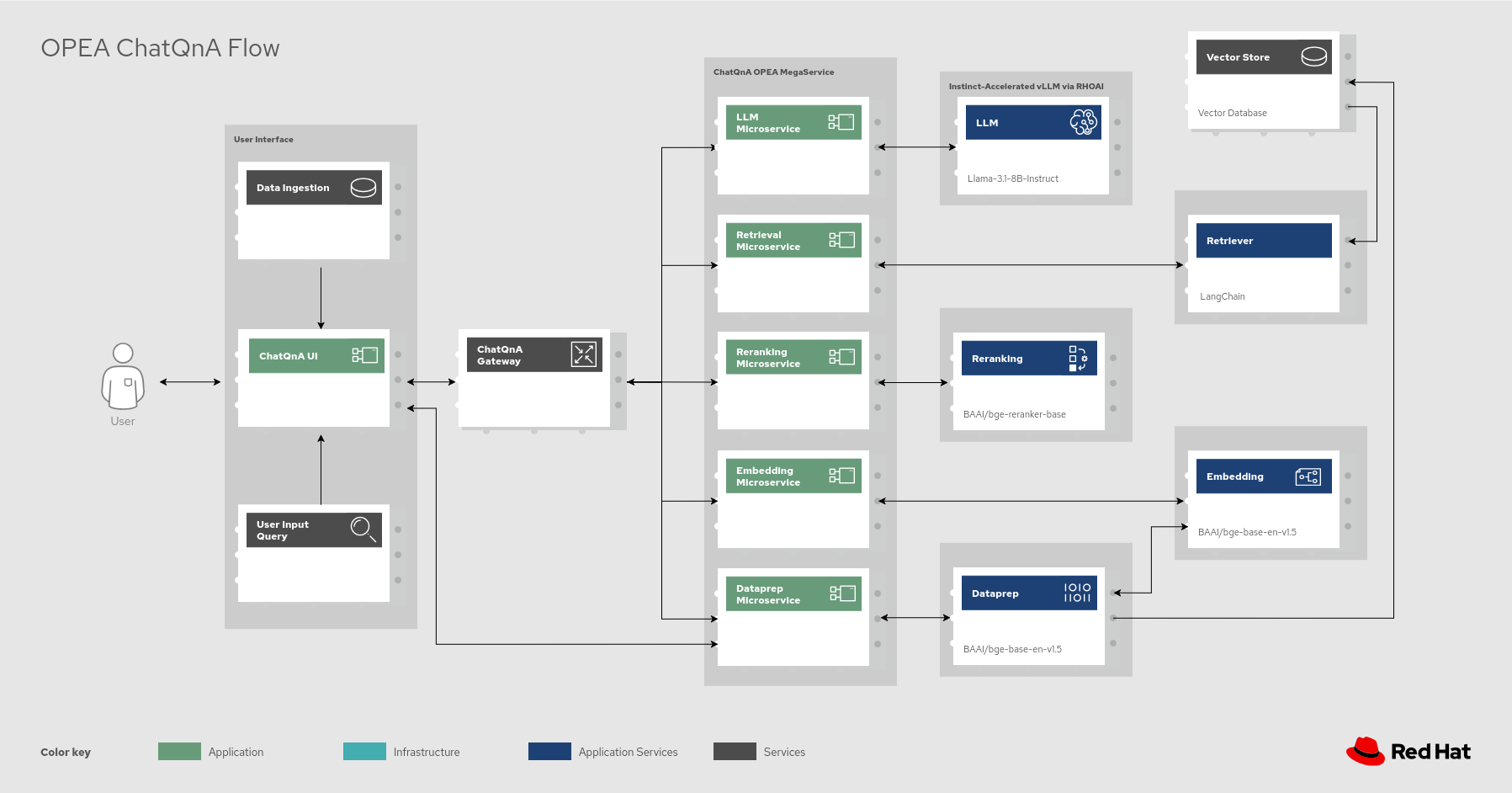
OPEA Chat QnA accelerated with AMD Instinct
Validation status:
Links:
About OPEA QnA chat accelerated with AMD Instinct pattern
- Background
This Validated Pattern implements an enterprise-ready question-and-answer chatbot utilizing retrieval-augmented generation (RAG) and capability reasoning using large language model (LLM). The application is based on the publicly-available OPEA Chat QnA example application created by the Open Platform for Enterprise AI (OPEA) community.
OPEA provides a framework that enables the creation and evaluation of open, multi-provider, robust, and composable generative AI (GenAI) solutions. It harnesses the best innovations across the ecosystem while keeping enterprise-level needs front and center. It simplifies the implementation of enterprise-grade composite GenAI solutions, starting with a focus on Retrieval Augmented Generative AI (RAG). The platform is designed to facilitate efficient integration of secure, performant, and cost-effective GenAI workflows into business systems and manage its deployments, leading to quicker GenAI adoption and business value.
This pattern aims to leverage the strengths of OPEA’s framework in combination with other OpenShift-centric toolings in order to deploy a modern, LLM-backed reasoning application stack capable of leveraging AMD’s Instinct hardware acceleration in an enterprise-ready and distributed manner. The pattern utilizes Red Hat OpenShift GitOps to bring a continuous delivery approach to the application’s development and usage based on declarative Git-driven workflows, backed by a centralized, single-source-of-truth git repository.
- Key features
AMD Instinct GPU acceleration for high-performance AI inferencing
GitOps-based deployment and management through Red Hat Validated Patterns
OPEA-based AI/ML pipeline with specialized services for document processing
Enterprise-grade security with HashiCorp Vault integration
Vector database support for efficient similarity search and retrieval
About the solution
The following solution integrates the OPEA ChatQnA example app with the Multicloud GitOps Validated Pattern to encapsulate every defined component as an easily trackable resource via OpenShift GitOps dashboard:
- Components
AI/ML Services
Text Embeddings Inference (TEI)
Document Retriever
Retriever Service
LLM-TGI (Text Generation Inference) from OPEA
vLLM accelerated by AMD Instinct GPUs
Redis Vector Database
Infrastructure
Red Hat OpenShift AI (RHOAI)
AMD GPU Operator
OpenShift Data Foundation (ODF)
Kernel Module Management (KMM)
Node Feature Discovery (NFD)
Security
HashiCorp Vault
External Secrets Operator

Figure 1. Overview of the solution

Figure 2. Overview of application flow
About the technology
The following technologies are used in this solution:
- Red Hat OpenShift Platform
An enterprise-ready Kubernetes container platform built for an open hybrid cloud strategy. It provides a consistent application platform to manage hybrid cloud, public cloud, and edge deployments. It delivers a complete application platform for both traditional and cloud-native applications, allowing them to run anywhere. OpenShift has a pre-configured, pre-installed, and self-updating monitoring stack that provides monitoring for core platform components. It also enables the use of external secret management systems, for example, HashiCorp Vault in this case, to securely add secrets into the OpenShift platform.
- Red Hat OpenShift GitOps
A declarative application continuous delivery tool for Kubernetes based on the ArgoCD project. Application definitions, configurations, and environments are declarative and version controlled in Git. It can automatically push the desired application state into a cluster, quickly find out if the application state is in sync with the desired state, and manage applications in multi-cluster environments.
- Red Hat Ansible Automation Platform
Provides an enterprise framework for building and operating IT automation at scale across hybrid clouds including edge deployments. It enables users across an organization to create, share, and manage automation, from development and operations to security and network teams.
- Red Hat OpenShift Data Foundation
It is software-defined storage for containers. Red Hat OpenShift Data Foundation helps teams develop and deploy applications quickly and efficiently across clouds.
- Red Hat OpenShift AI
Red Hat® OpenShift® AI is a flexible, scalable artificial intelligence (AI) and machine learning (ML) platform that enables enterprises to create and deliver AI-enabled applications at scale across hybrid cloud environments.
- Red Hat OpenShift Serverless
Red Hat® OpenShift® Serverless simplifies the development of hybrid cloud applications by eliminating the complexities associated with Kubernetes and the infrastructure applications are developed and deployed on. Developers will be able to focus on coding applications instead of managing intricate infrastructure details.
- Red Hat OpenShift Service Mesh
Red Hat® OpenShift® Service Mesh provides a uniform way to connect, manage, and observe microservices-based applications. It provides behavioral insight into—and control of—the networked microservices in your service mesh.
- Hashicorp Vault
Provides a secure centralized store for dynamic infrastructure and applications across clusters, including over low-trust networks between clouds and data centers.
- OPEA
OPEA is an ecosystem orchestration framework to integrate performant GenAI technologies and workflows leading to quicker GenAI adoption and business value.
